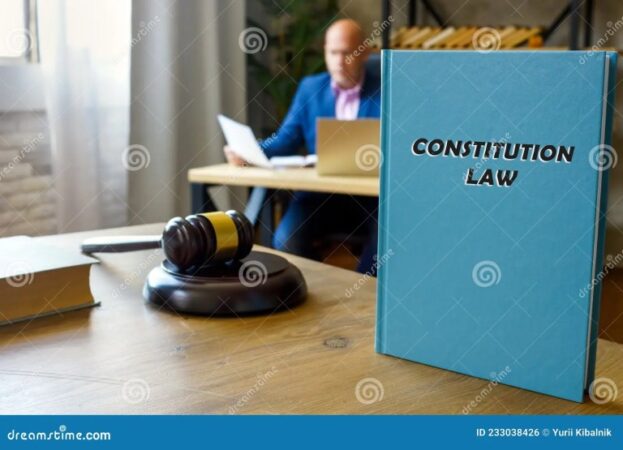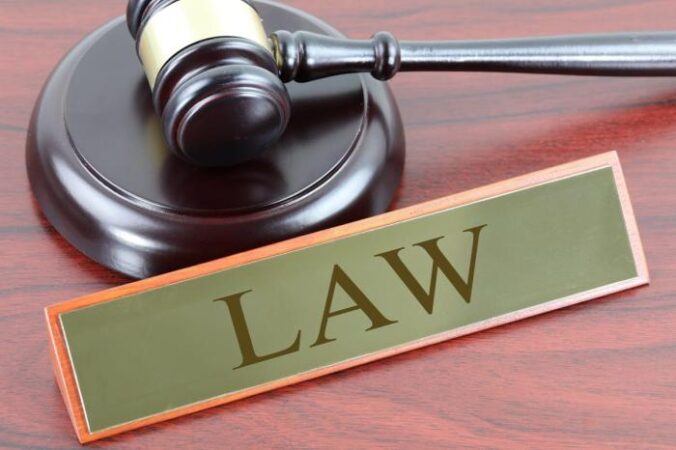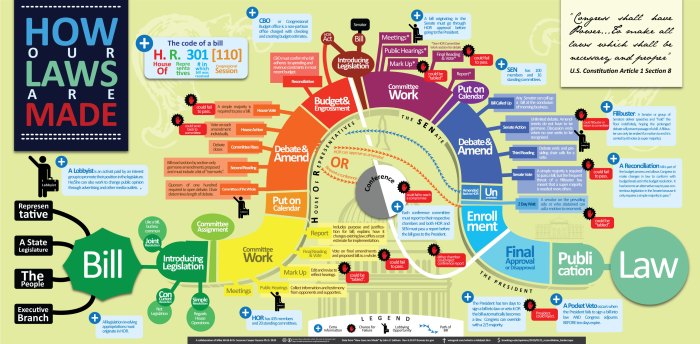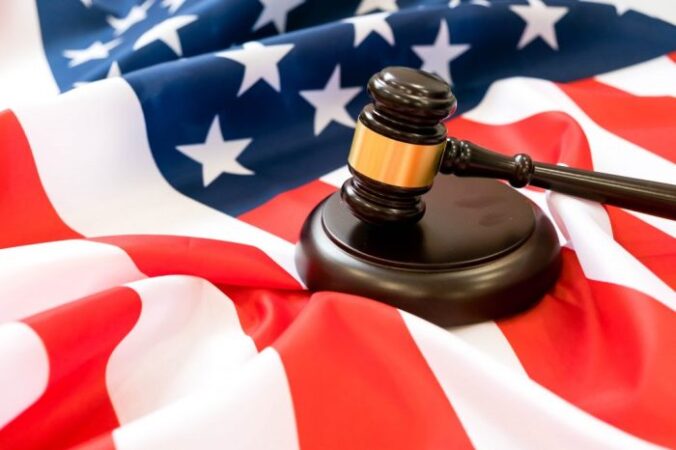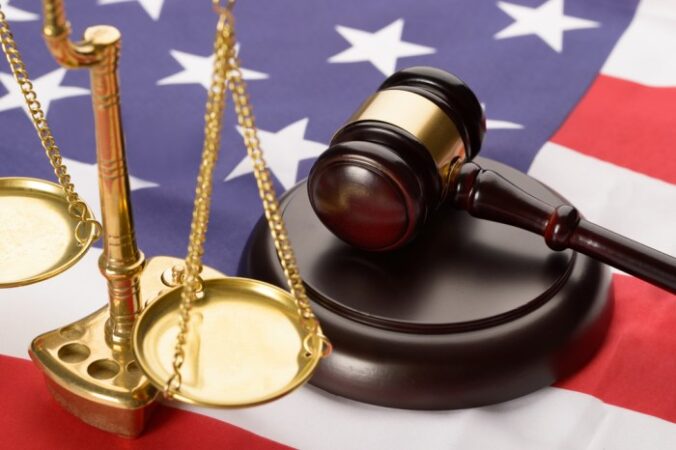
What is constitutional law? It’s the bedrock upon which our societies are built, the blueprint that defines the structure and operation of our governments, and the guardian of our fundamental rights. Constitutional law is a fascinating and complex field that touches every aspect of our lives, from the freedoms we enjoy to the way our laws are made and enforced.
Constitutional law is a dynamic system that evolves over time, reflecting the changing values and needs of society. It provides a framework for resolving disputes between individuals, groups, and the government, ensuring that power is exercised responsibly and that everyone is treated fairly.
Definition of Constitutional Law

Constitutional law is a fundamental branch of law that establishes the framework for a state’s governance, defines the relationship between the government and its citizens, and protects fundamental rights. It acts as the supreme law of the land, setting the boundaries of power and authority within a society.
Sources of Constitutional Law
The sources of constitutional law vary depending on the legal system in question. However, some common sources include:
- Written Constitutions: The most prominent source of constitutional law is a written constitution, a formal document that Artikels the structure, powers, and functions of the government. It often includes provisions on fundamental rights, the separation of powers, and the amendment process. Examples include the United States Constitution, the Indian Constitution, and the Canadian Charter of Rights and Freedoms.
- Judicial Precedent: In common law systems, judicial decisions play a crucial role in shaping constitutional law. Courts interpret the constitution and its provisions, establishing precedents that guide future decisions. These precedents, known as “stare decisis,” are binding on lower courts and can influence the development of constitutional law.
- Customary Law: In some jurisdictions, constitutional principles may be derived from long-standing customs and traditions. These customs, often rooted in historical practices and societal values, can contribute to the interpretation and application of constitutional law.
Constitutional Supremacy
Constitutional supremacy is a key principle in many legal systems. It dictates that the constitution is the highest law of the land, and all other laws must comply with its provisions. This principle ensures that the government operates within the boundaries set by the constitution and protects fundamental rights from infringement.
- Implications of Constitutional Supremacy:
- Limits on Government Power: The constitution sets limits on the powers of the government, preventing it from exceeding its authority and encroaching on individual rights.
- Judicial Review: Constitutional supremacy empowers courts to review legislation and executive actions to ensure their compatibility with the constitution. This process, known as judicial review, plays a crucial role in safeguarding the constitution’s integrity and protecting individual rights.
- Protection of Fundamental Rights: Constitutional supremacy guarantees that fundamental rights are protected from arbitrary interference by the government. These rights, enshrined in the constitution, serve as a bulwark against tyranny and ensure individual liberty.
Key Features of Constitutional Law
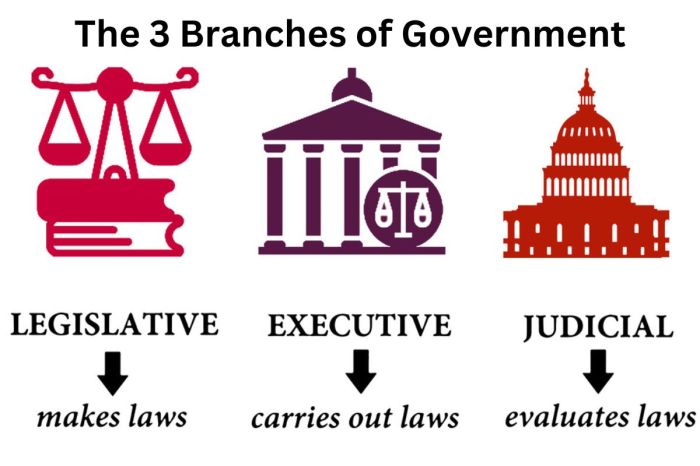
Constitutional law, as the foundation of a nation’s legal system, is characterized by several key features that define its structure and operation. These features ensure the protection of fundamental rights, the distribution of power, and the adherence to the rule of law.
Core Principles of Constitutional Law
Constitutional law rests on a set of fundamental principles that guide its interpretation and application. These principles, often referred to as the “pillars” of constitutionalism, form the bedrock of a just and democratic society.
- Separation of Powers: This principle divides governmental authority among different branches, typically the legislative, executive, and judicial branches. Each branch has its distinct functions and powers, preventing any one branch from becoming too powerful. This system of checks and balances ensures that no single entity can dominate the government, safeguarding individual liberties and promoting a balanced distribution of power. For instance, in the United States, the Congress makes laws, the President enforces them, and the Supreme Court interprets them, ensuring a system of checks and balances.
- Rule of Law: This principle emphasizes that everyone, including those in power, is subject to the law and that no one is above it. The rule of law ensures that laws are applied fairly and consistently, regardless of social status, political affiliation, or other factors. It also requires that laws be clear, accessible, and enforced in a predictable manner. The rule of law promotes accountability, transparency, and fairness in the administration of justice.
- Human Rights: Constitutional law recognizes and protects fundamental human rights, ensuring the dignity and freedom of individuals. These rights are often enshrined in a constitution’s bill of rights, guaranteeing basic freedoms such as freedom of speech, religion, assembly, and movement. These rights are considered inalienable, meaning they cannot be taken away without due process of law. Constitutional courts play a crucial role in upholding these rights by reviewing laws and government actions to ensure they do not infringe upon individual liberties. Examples include the right to life, liberty, and security of person, the right to freedom of expression, and the right to a fair trial.
Role of Constitutional Courts
Constitutional courts are specialized judicial bodies responsible for interpreting and enforcing constitutional provisions. They play a vital role in ensuring that laws and government actions comply with the constitution.
- Judicial Review: Constitutional courts have the power of judicial review, which allows them to review laws and government actions to determine their constitutionality. If a court finds a law or action to be unconstitutional, it can strike it down. This power is essential for safeguarding the constitution and preventing the government from exceeding its powers. For instance, the U.S. Supreme Court has used judicial review to strike down laws that violate the First Amendment’s guarantee of freedom of speech.
- Interpretation of Constitutional Provisions: Constitutional courts are tasked with interpreting the meaning of constitutional provisions, often in the context of specific cases. Their interpretations set precedents that guide future legal decisions. This process of interpretation ensures that the constitution remains relevant and adaptable to changing social and political contexts. For example, the Indian Supreme Court has interpreted the right to privacy as a fundamental right, despite not being explicitly mentioned in the Indian Constitution.
- Enforcement of Constitutional Rights: Constitutional courts also play a role in enforcing constitutional rights. They can issue rulings that compel the government to uphold these rights, such as ordering the release of individuals unjustly detained or requiring the government to provide certain services to citizens. This ensures that constitutional rights are not merely theoretical but have real-world implications. For example, the European Court of Human Rights has issued rulings compelling member states to uphold the right to a fair trial.
Constitutional Amendment Process
Constitutions are not static documents; they are designed to evolve over time to reflect changing societal values and address new challenges. This evolution occurs through the process of constitutional amendment.
- Formal Amendment Process: Most constitutions have a formal amendment process that Artikels the steps required to change the constitution. This process is often designed to be difficult, requiring supermajorities in legislative bodies or popular referendums, ensuring that changes to the constitution are made with careful consideration. This process also ensures that amendments reflect the will of the people and are not easily swayed by temporary political winds.
- Significance of Constitutional Amendments: Constitutional amendments are significant because they reflect fundamental changes in a nation’s legal and political framework. They can expand or restrict individual rights, redefine the balance of power, or address emerging societal concerns. For instance, the U.S. Constitution has been amended 27 times, addressing issues such as slavery, voting rights, and presidential succession.
Fundamental Rights and Liberties
Fundamental rights are the basic rights and freedoms that are essential for a dignified and fulfilling human life. They are considered inherent and inalienable, meaning they cannot be taken away or granted by any authority. These rights are enshrined in constitutions and international human rights instruments, serving as a cornerstone of a just and equitable society.
Importance of Fundamental Rights
Fundamental rights are crucial for protecting individual freedoms and ensuring a just and equitable society. They act as a shield against arbitrary state action and promote the values of liberty, equality, and dignity.
- Protection from Tyranny: Fundamental rights prevent the government from encroaching upon the personal lives of citizens and ensure that power remains in the hands of the people. They act as a safeguard against tyranny and arbitrary rule.
- Individual Autonomy: Fundamental rights empower individuals to make choices about their lives without undue interference from the state. They allow individuals to exercise their free will and pursue their aspirations.
- Social Progress: By promoting equality and non-discrimination, fundamental rights create a level playing field for all members of society. This fosters social progress and economic development.
- Accountability and Transparency: Fundamental rights hold the government accountable for its actions and promote transparency in governance. They empower citizens to challenge government decisions and ensure that power is exercised responsibly.
Examples of Fundamental Rights
Constitutions around the world typically include a bill of rights that guarantees fundamental rights and freedoms. Here are some common examples:
- Freedom of Speech: This right allows individuals to express their opinions, ideas, and beliefs without fear of censorship or reprisal. It is essential for a vibrant democracy and the free flow of information.
- Freedom of Religion: This right guarantees individuals the freedom to practice their religion or belief without interference. It includes the right to change religion, to manifest one’s religion, and to teach and propagate one’s religion.
- Freedom of Assembly: This right allows individuals to gather peacefully and express their views on matters of public concern. It is a cornerstone of democratic societies and allows citizens to participate in public discourse.
- Right to Equality: This right prohibits discrimination on grounds such as race, religion, gender, caste, or social status. It ensures equal opportunities and treatment for all individuals before the law.
- Right to Life, Liberty, and Security of Person: This right protects individuals from arbitrary arrest, detention, or violence. It is a fundamental human right that ensures the basic dignity and safety of all individuals.
Limitations and Exceptions to Fundamental Rights
While fundamental rights are essential, they are not absolute. There are certain limitations and exceptions to these rights that are necessary to protect the rights of others and maintain public order.
- Public Order: Fundamental rights can be restricted if they threaten public order or national security. For example, restrictions on freedom of speech may be imposed to prevent incitement of violence or hatred.
- Protection of Rights of Others: Fundamental rights can be limited to protect the rights of others. For instance, freedom of speech may be restricted to prevent defamation or slander.
- Public Morality: Fundamental rights can be limited to protect public morality. For example, restrictions on freedom of expression may be imposed to prevent the distribution of obscene materials.
Federalism and Constitutional Law
Federalism is a fundamental principle of constitutional law, shaping the structure and operation of many modern governments. It involves the division of governmental powers between a central (federal) government and regional (state) governments. This division of powers aims to balance the need for a unified national government with the importance of local self-governance.
Division of Powers in Federal Systems
The division of powers in federal systems is a defining feature of constitutional law. It Artikels the specific areas of authority and responsibility assigned to each level of government. The allocation of powers typically follows a principle of enumerated powers, where the federal government’s powers are explicitly listed in the constitution, while the remaining powers are reserved for the states. This principle is exemplified in the United States Constitution, which grants Congress the power to regulate interstate commerce, declare war, and coin money, while leaving matters like education, criminal law, and property rights to the states.
The Role of Constitutional Law in Resolving Conflicts
Constitutional law plays a crucial role in resolving conflicts that arise between different levels of government in federal systems. These conflicts can occur when state laws or actions are deemed to conflict with federal law or when the federal government attempts to regulate areas traditionally considered to be within the domain of the states. The courts, particularly the Supreme Court in the United States, have a critical role in interpreting the constitution and resolving these disputes. They use various legal principles, such as the Supremacy Clause, to determine which level of government has the ultimate authority in a particular matter.
The Supremacy Clause, found in Article VI of the U.S. Constitution, states that the Constitution and federal laws made pursuant to it are the supreme law of the land, and judges in every state are bound thereby.
Constitutional Law in Action: What Is Constitutional Law
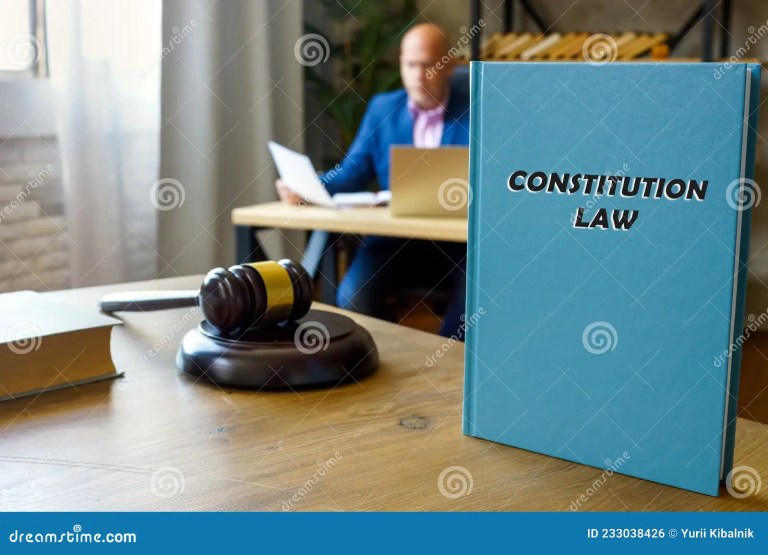
Constitutional law is not merely a theoretical framework; it is a living document that shapes the everyday lives of citizens and guides the actions of governments. This section explores how constitutional law is applied in real-world scenarios, its impact on social and political reforms, and the challenges surrounding its interpretation and application.
Examples of Constitutional Law in Action, What is constitutional law
Constitutional law plays a crucial role in resolving disputes and protecting individual rights. Here are some examples of how it is applied in real-world scenarios:
- Free Speech: The First Amendment to the U.S. Constitution guarantees the right to free speech. This right has been tested in numerous cases, such as the landmark case of *Schenck v. United States* (1919), where the Supreme Court upheld the conviction of a man who distributed leaflets urging resistance to the draft during World War I. The Court reasoned that speech can be restricted when it poses a “clear and present danger.” However, in subsequent cases, the Court has narrowed the scope of this exception, recognizing the importance of protecting even unpopular or offensive speech.
- Religious Freedom: The First Amendment also protects the free exercise of religion. This principle has been applied in cases involving the right to practice religious beliefs, such as the case of *Wisconsin v. Yoder* (1972), where the Court ruled that Amish parents could not be compelled to send their children to school past the eighth grade due to their religious beliefs.
- Equal Protection: The Fourteenth Amendment guarantees equal protection under the law. This provision has been used to challenge discriminatory practices based on race, gender, and other factors. For instance, the case of *Brown v. Board of Education* (1954) ruled that racial segregation in public schools was unconstitutional.
Impact of Constitutional Law on Social and Political Reforms
Constitutional law has been instrumental in driving social and political reforms. Here are some examples:
- Civil Rights Movement: The Civil Rights Movement of the 1950s and 1960s relied heavily on constitutional law to challenge segregation and discrimination. Landmark legislation like the Civil Rights Act of 1964 and the Voting Rights Act of 1965 were passed based on the principles of equal protection and due process.
- Women’s Rights Movement: The women’s rights movement also drew on constitutional law to advocate for equal rights for women. The Equal Rights Amendment (ERA), which was passed by Congress in 1972 but never ratified by enough states, sought to enshrine equal rights for women in the Constitution.
- LGBTQ+ Rights Movement: The LGBTQ+ rights movement has used constitutional law to challenge discrimination based on sexual orientation and gender identity. The Supreme Court’s ruling in *Obergefell v. Hodges* (2015), which legalized same-sex marriage nationwide, is a prime example of how constitutional law has been used to advance equality.
Challenges and Controversies in Constitutional Interpretation
Interpreting and applying constitutional provisions can be challenging and often leads to controversy. Here are some of the key issues:
- Originalism vs. Living Constitutionalism: One of the main debates in constitutional interpretation is whether to focus on the original intent of the framers (originalism) or to interpret the Constitution in light of contemporary values (living constitutionalism). This debate often arises in cases involving issues that were not anticipated by the framers, such as the use of technology or the changing nature of society.
- Judicial Activism vs. Judicial Restraint: Another ongoing debate is whether judges should be active in shaping the law (judicial activism) or should defer to the elected branches of government (judicial restraint). This debate is often tied to the issue of originalism vs. living constitutionalism, with proponents of originalism often advocating for judicial restraint.
- Balancing Rights: Many constitutional provisions protect competing rights, such as the right to free speech and the right to privacy. Balancing these rights can be difficult, and the courts often face the challenge of determining which right should prevail in a particular case.
International Constitutional Law
International constitutional law is a relatively new field of study that explores the relationship between national constitutions and international law, particularly international human rights law. It examines how international norms and principles influence the interpretation and application of domestic constitutional provisions.
Influence of International Human Rights Law
International human rights law has a profound influence on domestic constitutional systems. International human rights treaties, such as the International Covenant on Civil and Political Rights (ICCPR) and the International Covenant on Economic, Social and Cultural Rights (ICESCR), establish fundamental rights and freedoms that are increasingly recognized as binding upon states.
- Direct Incorporation: Some countries directly incorporate international human rights treaties into their domestic legal systems, making them directly applicable and enforceable in national courts. For example, South Africa’s Constitution explicitly states that international law is part of its legal system, giving it precedence over domestic law.
- Indirect Influence: Even when not directly incorporated, international human rights law can indirectly influence domestic constitutional interpretation. Courts often refer to international human rights norms as persuasive authority, drawing upon them to interpret ambiguous constitutional provisions or to develop new legal principles.
- Constitutionalization of Human Rights: International human rights law has contributed to the constitutionalization of human rights in many countries. This involves incorporating fundamental rights and freedoms into national constitutions, giving them a higher legal status and making them more difficult to amend.
Role of International Courts and Tribunals
International courts and tribunals play a crucial role in upholding constitutional principles by interpreting and applying international law, including international human rights law. These courts often have jurisdiction to adjudicate disputes between states or individuals and states, and their decisions can have a significant impact on domestic constitutional systems.
- European Court of Human Rights: The European Court of Human Rights (ECtHR) is a prime example of an international court that has significantly influenced national constitutional law. It has issued numerous rulings on human rights issues, which have been influential in shaping domestic legal systems in Europe. For instance, the ECtHR’s rulings on freedom of expression, freedom of religion, and the right to a fair trial have been widely cited by national courts in Europe.
- Inter-American Court of Human Rights: The Inter-American Court of Human Rights has a similar role in the Americas, interpreting and applying the American Convention on Human Rights. Its rulings have also been influential in shaping domestic constitutional law in the region.
- International Criminal Court: The International Criminal Court (ICC) is a specialized court that prosecutes individuals for crimes against humanity, genocide, and war crimes. While not directly focused on constitutional law, its rulings can have implications for domestic constitutional systems, particularly in relation to the enforcement of international criminal law and the protection of human rights.
Summary
Understanding constitutional law is essential for anyone who wants to be an informed citizen. It empowers us to participate in the democratic process, to hold our leaders accountable, and to defend our rights. By studying constitutional law, we gain a deeper appreciation for the principles that underpin our societies and the importance of protecting them for generations to come.
Questions and Answers
What are some examples of constitutional rights?
Constitutional rights vary depending on the country, but common examples include the right to freedom of speech, religion, assembly, and the right to a fair trial.
How can constitutional law be changed?
Constitutional amendments are typically made through a formal process that involves legislative approval, public referendums, or a combination of both.
What is the role of the judiciary in constitutional law?
Courts play a crucial role in interpreting and enforcing constitutional provisions. They decide whether laws are consistent with the constitution and can strike down laws that violate constitutional rights.
